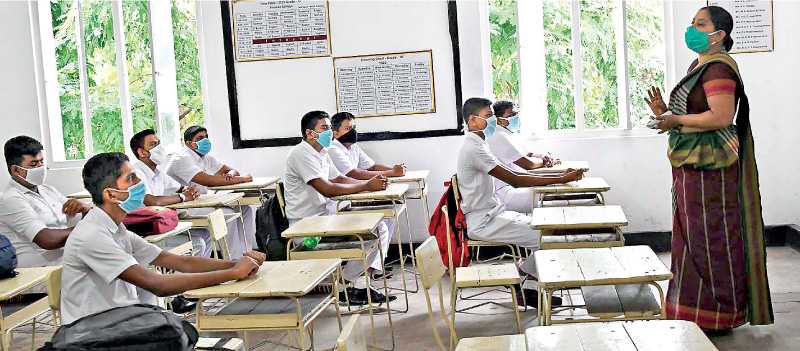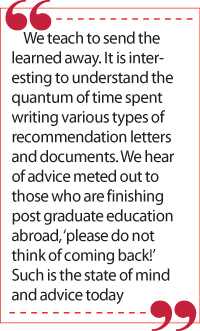Thursday Feb 12, 2026
Thursday Feb 12, 2026
Monday, 29 March 2021 00:00 - - {{hitsCtrl.values.hits}}

The great social experiment thrust upon us by the virus clearly gave many a lesson too. Those should be factored into a national road map for effective education with the future in mind. The situation in education begs for innovation. It is a system with long lag times and that too requires critical thinking, monitoring, and execution
 Education is a great differentiator and an equally capable of being a great social equaliser. How can one differentiate as well as equalise?! Carry out the process well, the results are interesting assets to any economy.
Education is a great differentiator and an equally capable of being a great social equaliser. How can one differentiate as well as equalise?! Carry out the process well, the results are interesting assets to any economy.
An economy that uses and values education certainly can differentiate itself from another that has no understanding of its value. Use the opportunities well as an individual and almost all your disabilities disappear and amply demonstrate social levelling. Hope these two simple statements answer the question in some way.
Are we in command with this understanding, is the key issue raised when I state that the learning is missing. Education serving the economy as well as individuals appears to be getting missed in action. We worry about the process of execution of the stages of education but the extraction from the inputs to the stages appears to be missing.
For the public sector education is expenditure, while the private sector understands it as an excellent business sector to invest in. The local economy is gasping for breath while external economies are winning export awards based on educating Sri Lankans!
With the economy in a spin which many feel still quite comfortable with while few others prophesy seriously damaging results points out that our minds perhaps are not exactly capable of deciphering signals clearly either way. The concept of ‘education needs education’ was made with that situation in mind. We know yet we do not know. When the knowledge is divisive the progress realised perhaps is not what you desire.
We teach to send the learned away
We teach to send the learned away. It is interesting to understand the quantum of time spent writing various types of recommendation letters and documents. We hear of advice meted out to those who are finishing post graduate education abroad, ‘please do not think of coming back!’ Such is the state of mind and advice today.
We articulate for the benefit of others considering that as the best business case for the day. Education is seen as a business but not as the great social necessity. Society moves up or down with the quality of this activity.
A recent seminar held by the Education Forum – SL’s Dr. Sujatha Hewage and Dr. Tara de Mel who have come together due to their sincere interest on the value of education to society and for creating a serious discourse – had a presentation which indicated that the 95% of the State’s expenditure is purely to pay the salaries of the teachers. Now just considering even education as a business, an enterprise that engages in an expenditure only to pay salaries of its members, it is easy to conclude that even as a business it is doomed to failure.
 History in education
History in education
Sri Lanka actually has a proud history in education. The bragging rights are possible for over 2,300 years. Some have even indicated what Francis Bacon had been acknowledged with – the scientific method – was quite in practice in those times.
The education process has been result-oriented. Knowledge was valued for its results through contribution to the society. Times passed and as per the historians these traditions and institutions appeared to have vanished with the end of the Polonnaruwa era. The modern form of schools and education started with the English but the scientific method was missing.
We became decent students and quite a few learnt well. Getting to know the facts was the name of the game. Putting facts into knowledge and skills were not exactly pursued. The education was pursued with the white-collar jobs in mind. Interestingly when low-paying State sector jobs are announced, still the queues are long. It is sad to hear observations such as ‘these graduates are likely to get much less than some domestics,’ the unfortunate reality hits home.
Are we carrying out education to realise such scenarios and to hear such observations? We know of many a thought-provoking comment on the value of education. To some the most important is education – education, education and education is a statement made with conviction.
Education 4.0
The world has declared that we are in the threshold of a new society. The virus put a spanner in the process of rate of change for sure but definitely that is a temporary phenomenon, however grave the ill effects. Any disruptive change makes it mandatory that education also has to change. That is why the World Economic Forum coined and articulated Education 4.0 to support Industry 4.0.
Our Industry 4.0 readiness is not there. How ready are we with Education 4.0? The question goes begging. When 95% of the expenditure is on salary we know there is not any money left to support development work. Disruptions cannot be handled with meagre investments. Overall the sum total available too is not sufficient.
There was a cry for 6% of GDP for education at one point. As a political slogan this may have surfaced again. The issue is not the value per se. What you do with what you have with the right intentions.
Listening to the TED talk of the young educator Bansal from Haryana in India, the story was absorbing. When Wendy Kopp started her movement of ‘Teaching for America’ in 1989, the vision and the commitment was compelling. These individuals are demonstrating leadership in bringing change and results – an aspect sorely needed in our system.
Without the learning, allocating 6% would again be money down the drain. I was once privy to a situation where a science teacher who got up and stated bravely – her pluck certainly was to be admired even though the content was not – when we were discussing emerging technologies that please there is no need for such technologies and that they are quite happy with what they are doing. This was by a teacher present in a gathering of teachers and there were quite a number present and there was no other view – a silent endorsement perhaps?
We engage in rote learning and we have situations where students with 3As are unable to enter into a university. What is the solution? The same person would queue for a job in a government setting and may finally end up in form filling, writing letters and making tea for bigger meetings. Examining the process of education for the national benefit has to be analysed.
In the tertiary sector another forum meeting indicated the departure of students almost 100% to different pastures and almost always never to return. Then you see a country analysis indicating that if Australia manages to get students to STEM streams, each 1% of positive change is likely to give 50 billion dollars to the Australian economy. What is happening is we will use valuable foreign exchange and pay royalties to education content and then subsequently relocate into those places. Sri Lanka stands to lose in multiple ways.
Are we oblivious to this situation? We of course state that brain gain is also not possible showing that if we get these PhD returnees back we will be in dire straits as no jobs are available. The society has no opportunities for advanced knowledge and skills. We will drive three-wheelers and wash and clean expensive vehicles with utmost care and attention and millions are in this segment. There is no connection to education to occupation with systems like this. We must start valuing the all-important education eco-system that is deteriorating fast.
Many lessons
The cyber physical systems in industry 4.0 would be based on a strong ICT backbone. The digital divide was exposed when the virus forced education to go online. There were some positive situations though it was clear it was the tuition services which were more agile in adoption and not the public school system. The issue was observed up to the university level.
The great social experiment thrust upon us by the virus clearly gave many a lesson too. Those should be factored into a national road map for effective education with the future in mind. The situation in education begs for innovation. It is a system with long lag times and that too requires critical thinking, monitoring, and execution.
At present one thing is clear. We are not serving ourselves well with the way we are giving education. The deteriorating process is not a recent phenomenon and the signs have been quite visible for some time. It just that we continue to fail to read and understand the signs for what they are or turn a blind eye and be content with somehow completing required tasks. We are a happy lot in some way when we see the assessment of SDG4 shows that education is the best performing SDG target for Sri Lanka. However SDG 4 does not take into account the broader and more significant elements of an education system. It is quite happy with a situation that sees students are passing through the system and all eligible are there in numbers. Not what the educated should see in education!